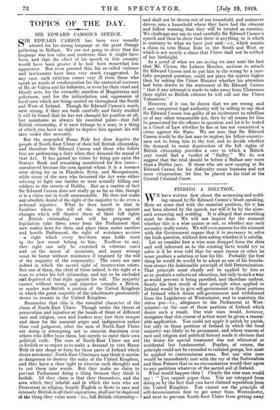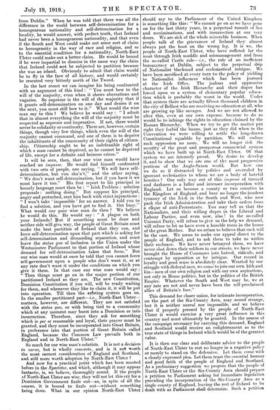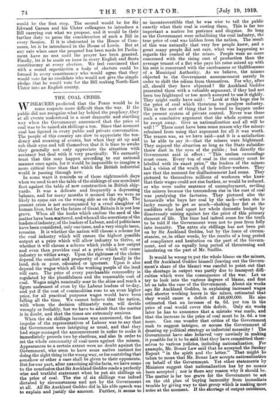FINDING A SOLUTION.
WE have written first about the screaming and scold- ing caused by Sir Edward Carson's blunt speaking. Here we must deal with the essential problem, for it has not been altered by the speech, nor will it be by the afore- said screaming and scolding. It is alleged that something must be done. We will not inquire for the moment whether this is a wise course or not, or whether any such necessity really exists. We will even assume for the moment with the Government organs that it is necessary to solve the Irish question, without first asking whether it is soluble.
Let us consider how a wise man dropped from the skies and well informed as to the existing facts would try to solve it if he were told that for some reason or other he must produce a solution or lose his life. Probably the first thing he would do would be to adopt as one of his founda- tion-stones the fashionable principle of Sell-Determination. That principle must clearly not be applied by him so as to produce a reductio ad absurdum, but only in such a way as would prevent it being parodied, and therefore undone. Surely the first result of that principle when applied to Ireland would be to give sell-government to those portions of Ireland which desire self-government and withdrawal from the Legislature at Westminster, and to maintain the status quo—i.e., allegiance to the Parliament at West- minster—in the case of those portions of Ireland which desire such a result. Our wise man would, however, recognize that this course of action must be given a reason- able application. You could not apply it parish by parish, but only to those portions of Ireland in which the local majority was likely to be permanent, and where reasons of race and religion and political history made it obvious that the desire for special treatment was not whimsical or accidental but fundamental. Further, of course, the principle could not be extended to isolated groups, but must be applied to conterminous areas. But our wise man would be immediately met with the cry of the Nationalists and Sinn Feiners that in no circumstances would they agree to any partition whatever of the sacred soil of Ireland. What would happen then I Clearly the wise man would say : " You cannot argue thu.S. You are estopped from doing so by the ?act that you have claimed separation from the United Kingdom. You cannot use the principle of self-determination first to get away from Westminster, and next to prevent North-East Ulster from getting away from Dublin." When he was told that there was all the difference in the world between self-determination for a homogeneous nationality and self-determination for a locality, he would answer, with perfect truth, that Ireland had never been a homogeneous nationality, and that even if the South and West could make out some sort of claim to homogeneity in the way of race and religion, and so to the essential condition for a nationality, North-East Ulster could make out a better claim. He would be bound if he were impartial to dismiss in the same way the claim that Ireland could -not be subjected to partition because she was an island. Obviously to admit that claim would be to fly in the face of all history, and would certainly be resented very bitterly north of the Tweed.
In the last resort we can imagine his being confronted with an argument of this kind : You must bow to the will of the majority, even when it shows aberrations and vagaries. So supreme is the will of the majority that if it grants self-determination on one day and denies it on the next, you must still bow to it." What would the wise man say to this ? We believe he would say : " I admit that in almost everything the will of the majority must be respected as supreme and imperative. If not, there would never be solidarity or continuity. There are, however, certain things, though very few things, which even the will of the majority cannot command, and one of them is to deprive the inhabitants of the community of their rights of citizen- ship. Citizenship ought to be an indefeasible right of which a• man cannot be deprived, as he cannot be deprived of life, except for a definite and heinous crime."
It will be seen, then, that our wise man would have reached an impasse. He would find himself confronted with two sets of people, one saying, " We will have self- determination, but you sha'n't," and the other saying, " We don't want self-determination, but if you have it we must have it too." His first report to his principal in homely language must then be : " Irish Problem : solution proposals : nothing doing." But suppose his principal, angry and perturbed, sent him back with strict injunctions : " I won't take ' impossible ' for an answer. I told you to find a solution, and you have got to find it. Get busy." What would our poor wise man do then ? We believe he would do this. He would say : " A plague on both your Irelands ! But if something must be done and neither side will give way, the people of Great Britain must make the best partition of Ireland that they can, and force self-determination upon that part which is asking for self-determination and demanding separation, and must leave the status quo of inclusion in the Union under the Westminster Parliament to that portion of Ireland whose demand for sell-determination takes that form." But our wise man would at once be told that you cannot force self-government upon a people who don't want it, or at any rate don't want it under the conditions on which you give it them. In that case our wise man would say : " Then things must go on in the major portion of our partitioned Ireland as they are. The new Constitution, Dominion Constitution if you will, will be ready waiting for them, and whenever they like to claim it, it will be put into operation. Till then the existing system goes on. In the smaller partitioned part—i.e., North-East Ulster— matters, however, are different. They are not satisfied with the status quo, or with being tied to a community which at any moment may burst into a Dominion or into insurrection. Therefore, since they ask for something which is per se reasonable and loyal, their prayer must be granted, and they must be incorporated into Great Britain, in preference into that portion of Great Britain called England; because the Common Law prevails both in England and in North-East Ulster."
So much for our wise man's solutidn. It is not a decision in vacito, but is wholly concrete, and is it not worth the most earnest consideration of England and Scotland, and still more worth adoption by North-East Ulster ? And now for a practical point which has been mooted before in the Spectator, and which, although it may appear fantastic, is, we believe, thoroughly sound. If the people of North-East Ulster are wise, they will not let this cry for a Dominion Government fizzle out—as, in spite of all the omens, it is bound to fizzle out—without something being done. What in our opinion North-East Ulster should say to the Parliament of the United Kingdom is something like this : " We cannot go on as we have gone on for the last thirty years, in a perpetual tumult of lies and recriminations, and with insurrection at our very doors. We are sick of the whole miserable business. When people talk of the grievances of Ireland they almost always put the boot on the wrong leg. It is we, the people of North-East Ulster, who have suffered far the most through Irish muddle and mismanagement and from the so-called Castle rule—i.e., the rule of an inefficient bureaucracy at Dublin, subject to the perpetual drip of Nationalist blackmail and ecclesiastical intrigue. We have been sacrificed at every turn to the policy of yielding to Nationalist influences which has been pursued at the Irish Office. The jealous and oppressive character of the Irish Hierarchy and their dupes has forced upon us a system of elementary popular educa- tion which is probably the worst in the world. Under that system there are actually fifteen thousand children in the city of Belfast who are receiving no education at all, who are growing up like savages. And we are not allowed to alter this, even at our own expense, because to do so would be to infringe the rights in education claimed by the Roman Hierarchy. When we try to get the matter put right they forbid the banns, just as they did when in the Convention we were willing to settle the long-drawn Constitutional squabble by partition. We will endure such oppression no more. We will no longer risk the security of the great and prosperous commercial system which we have built up in North-East Ulster. Of that system we are intensely proud. We desire to develop it, and to show that we are one of the most progressive portions of the Anglo-Saxon world. But how can we do so if distracted by politics and overruled by ignorant ecclesiastics to whom we are a body of hateful heretics ? Our only way out of this impasse of turmoil and darkness is a fuller and intenser incorporation with England. Let us become a county or two counties in the Kingdom of England, and bear no longer the insolent tyranny of the Irish in the South and West, who now pack the Irish Administration and take their orders from a clique of anti-Protestants. You may tell us that the Nationalists, and their willing dupes in the Liberal and Labour Parties, and even now, alas ! in the so-called Unionist Party, will refuse to give us the help we demand, will refuse to let us have even a humble room in the house of the great Mother. But we refuse to believe that such will be the case. We mean to make our appeal direct to the people of England, and to ask them to take us within their embrace. We have never betrayed them, we have never shot down their soldiers in our streets, we have never brought the House of Commons into hatred, ridicule, and contempt by opposition or by intrigue. Our record in loyalty and good sense is absolutely clear. Wearied by our struggle with disloyal men, we come to join our own kith and kin—men of our own religion and with our own aspirations, not only in Home politics, but in the politics of the British Empire. Whatever the South and West may be, we at any rate are not and never have been the self-proclaimed allies of Britain's foes."
This demand for closer union, for intimate incorporation, on the part of the Six-County Area, may sound strange, but it is neither unreal nor impossible, and we believe that if properly pressed by the people of North-East Ulster it would exercise a very great influence in this country and must ultimately be granted. In the course of the campaign necessary for carrying this demand, England and Scotland would receive an enlightenment as to the true state of things in Ireland which would be of the greatest value.
It is then our clear and deliberate advice to the people of North-East Ulster to rest no longer in a negative policy or merely to stand on the defensive. Let them come with a clearly expressed plea. Let them trust the essential honour and good faith of the people of England and Scotland. As a preliminary suggestion we propose that the people of North-East Ulster or the Six-County Area should prepare a petition to Parliament asking for immediate legislation providing the incorporation of the Six-County Area as a single county of England, leaving the rest of Ireland tobe dealt with as Parliament shall determine. Such a petition would be the first step. The second would be for Sir Edward Carson and his Ulster colleagues to introduce a Bill carrying out what we propose, and it would be their further duty to press the consideration of such a Bill in every Session. If it is obstructed in the House of Com- mons, let it be introduced in the House of Lords. But at any rate when once the proposal has been made let Parlia- ment have .no rest until the prayer has been granted. Finally, let it be made an issue in every English and Scots constituency at every election. We feel convinced that with a sound organization a body of electors could be formed in every constituency who would agree that they would vote for no candidate who would not give the simple pledge that he would vote for the Bill making North-East Ulster into an English county.




































 Previous page
Previous page